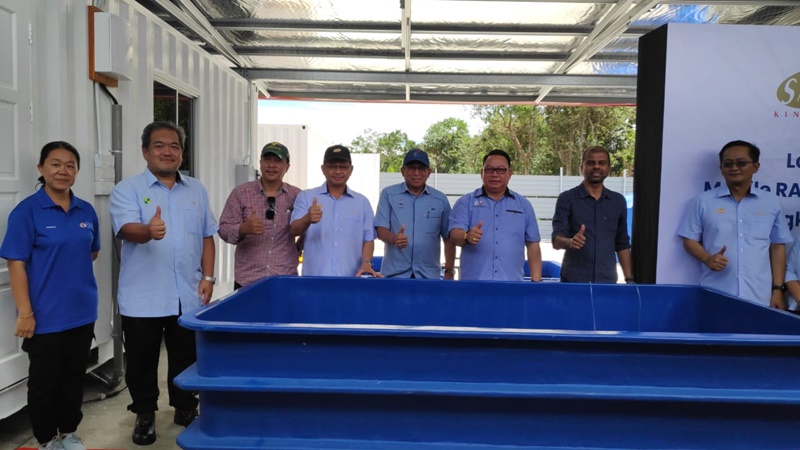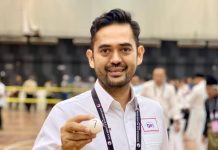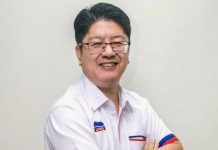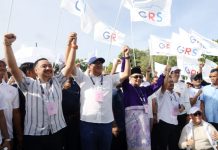KOTA MARUDU: Borneo Lestari Sdn. Bhd., a leading sustainable agriculture and aquaculture industry, has set its sights on an extraordinary feat – achieving a Net Zero Water Footprint while maximizing water usage in agriculture and aquaculture. With an unwavering
commitment to sustainability, the company aims to establish a closed-loop aquaculture system that recycles water continuously, eliminating the need for fresh water from primary sources.
Director of Borneo Lestari, Irwin Wong, explained the organisation's vision to attain a net zero water footprint by making efficient use of excess water through innovative methods, such as rainwater harvesting.
This surplus water will be redirected to rivers or agricultural fields for irrigation purposes, minimizing waste and optimizing resource utilisation.
A significant contributor to this groundbreaking endeavor is the Memorandum of Understanding signed between Borneo Lestari and Sawit Kinabalu Sdn. Bhd. two years ago. This strategic partnership is expected to yield an impressive annual fish production of up to 1,250 tonnes.
“We are optimistic that we will achieve our production target of 30 metric tons by the end of 2023,” stated Irwin Wong confidently.
“Through dedicated efforts and close collaboration with University Malaysia Sabah (UMS), we have a high level of confidence in our ability to increase fish seed production.”
The collaboration between Borneo Lestari and Sawit Kinabalu focuses on a barramundi or
siakap breeding aquaculture project, which spans four phases. Situated on a 14-hectare plot owned by Sawit Kinabalu Group in Langkon, Kota Marudu, the project is set to revolutionize fish production in the region.
During the launch of the Mobile RAS (Recirculating Aquaculture System) Filtration Plant by
Borneo Lestari Sdn. Bhd. recently, Assistant Minister of Agriculture and Fisheries, Hendrus
Anding, released approximately 4,000 barramundi or siakap fish. This event marked a significant milestone in the project's development.
In a comprehensive presentation detailing the project’s performance and financial expenditure report, Irwin Wong shed light on the challenges faced by the organization. He highlighted flooding as a major obstacle encountered during phase 1.
To ensure the project’s long-term durability, Borneo Lestari proactively took measures to prepare elevated sites.
In addition to flooding, the project faced soil conditions that were not conducive for optimal
production. Addressing this issue required additional efforts, including the removal of organic waste, disposal of branches and trees, and implementation of other necessary measures.
Irwin emphasized that these actions were crucial in establishing a solid foundation and structures for the project’s success.
The presentation underscored Borneo Lestari's unwavering commitment to addressing and overcoming challenges as they strive to achieve their development objectives.
“We hope that the Economic Stimulus Implementation & Coordination Unit between National Agencies (LAKSANA) team can provide us with the necessary allocations, through other grants, to ensure food security and establish a hatchery, nursery, and genetic research unit,” Irwin added.
He highlighted that this unit would collaborate with the UMS Marine Research Institute
and the Sabah State Fisheries Department to develop a comprehensive database for recording and microchipping selected parent fish, or "induk," for tracking purposes.
These parent fishexhibit exceptional potential for producing high-performance fish seeds, characterized by fast growth, resilience, low bone ratios (more meat than bone), and low food conversion rates.
Furthermore, Borneo Lestari, together with University Malaysia Sabah (UMS) and Borneo
Marine Research Institute (BMRI), recently signed a Letter of Intent (LOI) to expand their
collaboration on brood stock resources and gene pool sharing for various fish species intended for human consumption.
According to Irwin, Sawit Kinabalu possesses the capability to contribute to fish food production by utilizing palm oil by-products or incorporating palm oil materials.
“Therefore, one of our objectives with this project is to produce food using ingredients derived from palm oil.”
To further enhance sustainability, Borneo Lestari aims to implement photovoltaic energy
generation by equipping the blocks with solar panels. These panels will generate power for
water filtration purposes and farm management, as highlighted by Irwin.
“To generate sufficient power for the operation of the RAS Mobile Plant, running for 6 hours per day for water filtration, we require a roof area of 90 square meters to harness solar energy. We are highly confident that our next milestone is for the RAS Mobile Plant to achieve 100% reliance on solar energy. ”
The event witnessed by Managing Director of Sawit Kinabalu Group Datuk Bacho Jansie,
Director of Sabah Fisheries Department Azhar Kassim, Deputy Director of LAKSANA, V. Jaya
Kumaran, Suhaime Ejip from Deputy State Secretary of Sabah office, Dr. Annita Ying from
Borneo Marine Research Institute, UMS Sabah and Controller of Advisory and Agri Business
Sawit Kinabalu Khairul Azhan Othman.-pr/BNN






